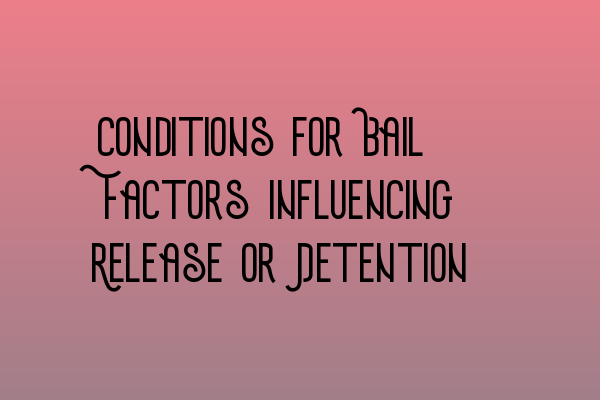Conditions for Bail: Factors Influencing Release or Detention
When an individual has been arrested and charged with a criminal offense, the court must carefully consider whether to grant them bail or detain them until their trial. Bail is a legal term that refers to the temporary release of an accused person, with certain conditions attached, until their trial date. The court’s decision to grant bail or keep the accused in detention is influenced by several factors. Understanding these factors is essential to navigating the complex process of securing bail. In this article, we will explore the conditions for bail and the key factors that influence release or detention.
Presumption of Bail
In the UK, there is a general presumption in favor of granting bail, as the law recognizes the importance of an accused person’s right to liberty. Bail should be granted unless there are strong reasons to believe that the accused will abscond, interfere with the witnesses, obstruct the course of justice, or commit further offenses while on bail. The court, however, must balance this presumption with the protection of the public and the interests of justice.
Factors Influencing Release
When deciding whether to grant bail, the court takes into account various factors, such as:
- The nature and seriousness of the offense: The court considers the severity of the alleged offense. If the offense is minor or non-violent, the chances of being granted bail are higher.
- The strength of the evidence: The court assesses the strength of the evidence against the accused. If the evidence is weak or there are doubts about the case, the court may be more inclined to grant bail.
- The accused’s criminal history: The court examines the accused’s criminal record, including any previous convictions or breaches of bail conditions. A good track record may increase the likelihood of being granted bail.
- The accused’s ties to the community: The court considers the accused’s family, employment, and community ties. Strong roots in the community suggest that the accused is less likely to abscond and may therefore be granted bail.
- The accused’s financial resources: The court evaluates the accused’s financial means. If the accused can afford to post a substantial bail amount, it may strengthen their case for release.
- The availability of suitable bail conditions: The court considers whether appropriate bail conditions can be imposed to address any concerns and ensure the accused’s compliance with the law. Such conditions may include surrendering a passport, reporting to the police regularly, or residing at a specified address.
Factors Influencing Detention
The court may decide to detain the accused if any of the following factors are present:
- The seriousness of the offense: If the alleged offense is particularly grave or involves violence, the court may be more inclined to deny bail to protect the public.
- The risk of absconding: If there are substantial reasons to believe that the accused may try to flee the jurisdiction to avoid trial, the court may refuse bail.
- The risk of reoffending: If the accused has a history of previous offenses or poses a significant risk of committing further crimes while on bail, the court may determine that detention is necessary to protect the public.
- The risk of interfering with witnesses: If there is a genuine concern that the accused may try to intimidate witnesses or tamper with evidence, the court may deny bail to protect the integrity of the trial process.
- The accused’s previous breaches of bail conditions: If the accused has a history of non-compliance with bail conditions, the court may be inclined to refuse bail due to the perceived risk of future breaches.
In conclusion, obtaining bail is not guaranteed, and the court weighs various factors before deciding whether to release or detain an accused person. The nature of the offense, the strength of the evidence, the accused’s criminal history, ties to the community, financial means, and the availability of suitable bail conditions all play a role in the court’s decision-making process. Understanding these factors is crucial in presenting a strong case for bail.
If you are preparing for your SQE exams or looking for comprehensive SQE preparation courses, SQE 1 Practice Exam Questions and SQE 1 Preparation Courses are valuable resources to enhance your understanding of criminal law. Additionally, to stay up-to-date with important SRA SQE exam dates, make sure to check out the SRA SQE Exam Dates page.
